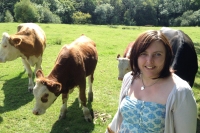Cows hold key to antibiotics of the future

Dr Sharon Huws
22 July 2014
Urgent action is required to tackle the growing threat of resistance to antibiotics, and Dr Sharon Huws and her team at Aberystwyth University’s Institute of Biological, Environmental and Rural Sciences (IBERS) have characterised over 80 novel antimicrobials from microscopic bacteria in a cow’s rumen; with the potential to be used in treating bacterial infections in humans.
Dr Sharon Huws, a Coleg Cymraeg Cenedlaethol Lecturer in animal Science at IBERS said; “The rumen houses a vast quantity of microbes which essentially degrade forages eaten by the animal and release nutrients for their growth. In the rumen the microbes work together as a partnership but often compete with each other.
We have known for many years that some of the rumen microbes produce the antimicrobial bacteriocin, which aids their competitiveness in the rumen. Therefore it seemed likely that they also produced other antimicrobials which could potentially be used to treat human infections.”
The rumen is a specialised compartment in the gut through which cows are able to acquire nutrients from plant-based food by fermenting it prior to digestion in the stomach, principally through bacterial actions.
Sheep and cows are known as ruminants, a word that comes from the Latin ruminare, which means to ‘chew twice’, and the process of regurgitating fermented grass and chewing it again is known as ‘chewing the cud’ which further breaks down cellulose in grass and stimulates digestion.
The alarming increase in antibiotic resistance in disease causing bacteria, coupled with the decrease in drug discovery rate is now a serious medical challenge and it has been over 30 years since the last novel antibiotics were discovered. This coupled with the increase in resistance to existent antimicrobials is of major concern for human health.
Dr Huws and her group have been working on this project for the last two years with the Nigerian government and are currently testing the efficiency of the isolated novel rumen antimicrobials; and she is also involved in a BBSRC Brazil partnering award of £50,000 over 4 years to co-operate on discovering antibiotics in rumen microbes.
She has also recently received NRN life Sciences funding from the Welsh Government to continue this work and further the understanding of how these antimicrobials work and their potential to be used in treating bacterial infections in humans.
Dr Sharon Huws will be at the Royal Welsh Show on Tuesday 22nd and Wednesday 23rd July and can be available for interview. She will be based in the AU Education Pavilion G476 adjacent to S4C above the Main Ring. Mobile: 07801 942822
AU30614



